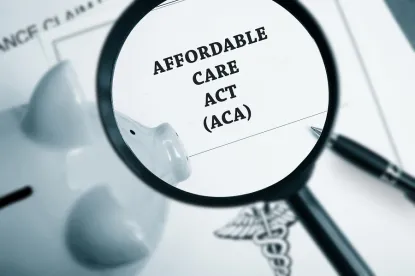The Internal Revenue Service (“IRS”) recently issued proposed regulations affecting certain reporting deadlines under the Patient Protection and Affordable Care Act (“ACA”). Specifically, proposed regulations would make permanent an automatic 30-day extension for issuing Forms 1095-B and 1095-C to covered individuals and employees, which would otherwise be due by January 31. The proposed regulations also introduce an alternative method for providing these forms to individuals, which may reduce the reporting burden, and eliminated the good faith relief for reporting entities whose ACA forms are incomplete or inaccurate.
While the proposed regulations technically would become effective for coverage in calendar years beginning January 1, 2022, the IRS has indicated that reporting entities may rely on them starting with the reports due for 2021 (provided to covered individuals and employees in 2022).
Background on Required ACA Forms
Pursuant to Sections 6055 and 6056 of the Internal Revenue Code (the “Code”), providers of health coverage (insurance companies or self-insured plans) and applicable large employers (“ALEs,” generally those with 50+ full-time or full-time equivalent employees) must file statements with the IRS, and distribute statements to covered individuals or employees (as applicable) regarding whether they were offered or provided “minimal essential coverage” each month of the prior year. The prescribed forms for these statements are:
-
To the IRS: Form 1094-B (from insurers) and Form 1094-C (from ALEs) – currently due on or before February 28 (or March 31 if filed electronically)
-
To individuals: Forms 1095-B (from insurers) and 1095-C (from ALEs) – currently due on or before January 31
Applicable regulations also permit reporting entities to apply for a 30-day extension for good cause for providing Forms 1095-B and 1095-C to individuals, and provide authority for the Commissioner to issue guidance granting automatic 30-day extensions.
From 2015 to 2020, the IRS recognized the difficulty of a January 31 turn-around and issued temporary relief in the form of automatic 30-day extensions of the deadline to provide Forms 1095-B and 1095-C to individuals. See, e.g., IRS Notice 2020-76. Although the temporary relief did not extend the deadline to file the required information to the IRS.
Proposed Extended Deadline for Forms 1095-B and 1095-C (to Individuals)
The proposed regulations would now make permanent and automatic the 30-day extension for Forms 1095-B and 1095-C – employers and insurance providers would not be required to demonstrate good cause. No further extensions are contemplated – the good cause provision and the authority for the Commissioner to issue additional automatic extensions are eliminated. Similar to the previous temporary extensions, the proposed regulations do not extend the deadline to file this information with the IRS.
| Old Deadline | New Deadline | ||
|
Deadline to Distribute Forms to Employees and Other Covered Individuals
(Forms 1095-B and 1095-C) |
January 31, 2022
With possible 30-day extension for good cause upon application to the IRS |
March 2, 2022 | |
|
Deadline to File with the IRS
(Forms 1094-B and 1094-C) |
Paper: February 28, 2022
Electronic: March 31, 2022 (note: electronic filing is required if filing 250+ forms) With possible 30-day extension upon application to the IRS using Form 8809 |
NO CHANGE |
Alternative Methods of Furnishing Statements to Individuals
The proposed regulations would also codify and expand on previous temporary relief that provided alternative methods of complying with the requirements to furnish notices to individuals. Specifically, as long as the shared responsibility penalty remains at $0, reporting entities will be deemed to comply with the requirements to furnish notices to certain individuals if they timely post a “clear and conspicuous” notice on their website, through October 15, with contact information and an explanation of how the individual could receive a copy of the applicable form. If requested by an individual, the form must be furnished within 30 days.
This relief applies to ALEs, insurers and multiemployer plans as follows:
-
For ALEs: applies to the requirement to provide Forms 1095-C (and/or Forms 1095-B if the coverage is self-insured), but only with respect to non-full-time employees and non-employees enrolled in the self-insured plan. Thus, ALEs will still have to furnish the applicable forms to full-time employees in the traditional manner.
-
For insurers and multiemployer plans: applies to the requirement to provide Forms 1095-B to all covered individuals.
The relief does not change any of the requirements for reporting to the IRS. Thus, even if an ALE or plan that takes advantage of the relief, it will still have to complete Forms 1095-B and 1095-C in order to file them with the IRS.
Reporting entities should also be aware that, notwithstanding (and in some cases as a result of) the elimination of the penalty under the federal individual mandate, five states and Washington, D.C. have their own individual mandates and concomitant information reporting requirements. Reporting entities should look to their particular state’s requirements because state information reporting requirements may not align with the federal guidance, including with respect to the requirement to send reporting forms to employees or other covered individuals.
Transitional Good Faith Relief Eliminated
The transitional good faith relief from penalties under Code Section 6721 and 6722 (i.e., the penalties for reporting incorrect or incomplete information on returns or individual statements) will not be extended for tax year 2021. The IRS concluded that this relief was no longer appropriate because the six years that the relief was in place provided sufficient time for reporting entities to familiarize themselves with the nuances of the reporting requirements.
Takeaways
Reporting entities may rely on the automatic extension relief for their 2021 reports, meaning Forms 1095-B and 1095-C must be provided to the applicable individuals no later than March 2, 2022 (no further extensions permitted).
Additionally, reporting entities may want to review their practices and consider the alternative methods of furnishing these forms where permitted, while also keeping in mind possible state law requirements. In any case, the proposed regulations should not impact their practices with respect to filing ACA forms with the IRS.
Finally, reporting entities should carefully complete all forms and reach out to counsel if they have any questions, as they will no longer have the benefit of good faith relief from penalties if forms are inaccurate or incomplete.





 />i
/>i

